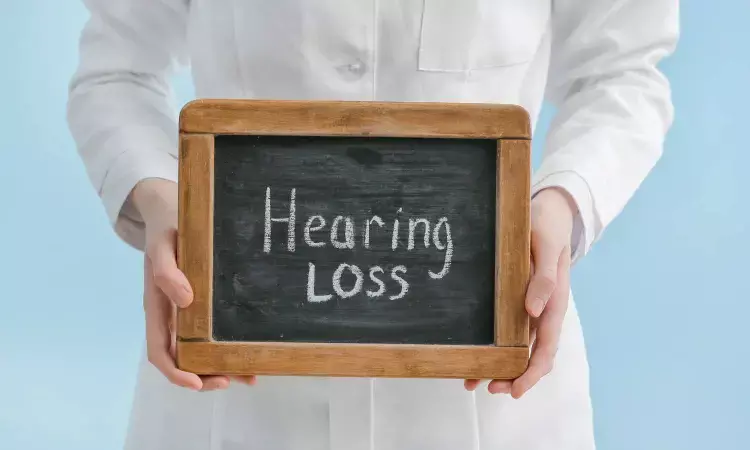- Home
- Medical news & Guidelines
- Anesthesiology
- Cardiology and CTVS
- Critical Care
- Dentistry
- Dermatology
- Diabetes and Endocrinology
- ENT
- Gastroenterology
- Medicine
- Nephrology
- Neurology
- Obstretics-Gynaecology
- Oncology
- Ophthalmology
- Orthopaedics
- Pediatrics-Neonatology
- Psychiatry
- Pulmonology
- Radiology
- Surgery
- Urology
- Laboratory Medicine
- Diet
- Nursing
- Paramedical
- Physiotherapy
- Health news
- Fact Check
- Bone Health Fact Check
- Brain Health Fact Check
- Cancer Related Fact Check
- Child Care Fact Check
- Dental and oral health fact check
- Diabetes and metabolic health fact check
- Diet and Nutrition Fact Check
- Eye and ENT Care Fact Check
- Fitness fact check
- Gut health fact check
- Heart health fact check
- Kidney health fact check
- Medical education fact check
- Men's health fact check
- Respiratory fact check
- Skin and hair care fact check
- Vaccine and Immunization fact check
- Women's health fact check
- AYUSH
- State News
- Andaman and Nicobar Islands
- Andhra Pradesh
- Arunachal Pradesh
- Assam
- Bihar
- Chandigarh
- Chattisgarh
- Dadra and Nagar Haveli
- Daman and Diu
- Delhi
- Goa
- Gujarat
- Haryana
- Himachal Pradesh
- Jammu & Kashmir
- Jharkhand
- Karnataka
- Kerala
- Ladakh
- Lakshadweep
- Madhya Pradesh
- Maharashtra
- Manipur
- Meghalaya
- Mizoram
- Nagaland
- Odisha
- Puducherry
- Punjab
- Rajasthan
- Sikkim
- Tamil Nadu
- Telangana
- Tripura
- Uttar Pradesh
- Uttrakhand
- West Bengal
- Medical Education
- Industry
Can labyrinthectomy for Manier's disease impact hearing in contralateral ear in long-term?

A recent study identified a significant risk for unilateral Meniere's disease (MD) patients in developing low-frequency sensorineural hearing loss over the long term. The findings of the study were published in American Journal of Otolaryngology.
The study, spanning from 2008 to 2012, enrolled patients who underwent labyrinth removal as part of MD management or translabyrinthine (TLAB) acoustic neuroma resection. Pure tone averages (PTA) were utilized to measure long-term hearing changes, with a specific focus on low-frequency PTA (250, 500, and 1000 Hz).
Comparing the outcomes between MD patients and the TLAB group, the results were striking. MD patients experienced a notably higher degree of hearing loss during the follow-up period in comparison to the TLAB group. The data revealed that MD patients exhibited a low-frequency PTA loss of 7.54 ± 2.11 dB, while the TLAB group showed a considerably lower loss of 2.39 ± 1.10 dB (p = 0.035).
The most compelling discovery was the 28.6% of MD patients who encountered a substantial increase of ≥30 dB in low-frequency PTA, indicating a significant hearing deterioration. Astonishingly, none of the individuals in the TLAB group crossed this hearing loss threshold, underscoring the distinct vulnerability of MD patients to this specific hearing impairment.
As the findings illuminate the heightened risk of MD patients developing low-frequency sensorineural hearing loss a decade post-labyrinthectomy, the implications for clinical practice are evident. Regular audiometric assessments are strongly recommended for MD patients following labyrinth removal. This proactive approach will enable clinicians to monitor hearing changes effectively and intervene promptly if significant deterioration is detected.
The study not only contributes to a deeper understanding of the hearing outcomes associated with labyrinthectomy for MD but also provides a basis for refining patient care strategies. The insights gained from this research emphasize the necessity of personalized, long-term monitoring plans for MD patients, with a focus on preserving their auditory health and enhancing their quality of life.
Source:
Babu, K. C., Fritz, C. G., Choi, J. S., Casale, G. G., Fan, C. J., Lucas, J. C., & Babu, S. C. (2023). Does labyrinthectomy have an impact on hearing in the contralateral ear during long-term follow-up? In American Journal of Otolaryngology (Vol. 44, Issue 6, p. 103989). Elsevier BV. https://doi.org/10.1016/j.amjoto.2023.103989
Neuroscience Masters graduate
Jacinthlyn Sylvia, a Neuroscience Master's graduate from Chennai has worked extensively in deciphering the neurobiology of cognition and motor control in aging. She also has spread-out exposure to Neurosurgery from her Bachelor’s. She is currently involved in active Neuro-Oncology research. She is an upcoming neuroscientist with a fiery passion for writing. Her news cover at Medical Dialogues feature recent discoveries and updates from the healthcare and biomedical research fields. She can be reached at editorial@medicaldialogues.in
Dr Kamal Kant Kohli-MBBS, DTCD- a chest specialist with more than 30 years of practice and a flair for writing clinical articles, Dr Kamal Kant Kohli joined Medical Dialogues as a Chief Editor of Medical News. Besides writing articles, as an editor, he proofreads and verifies all the medical content published on Medical Dialogues including those coming from journals, studies,medical conferences,guidelines etc. Email: drkohli@medicaldialogues.in. Contact no. 011-43720751


